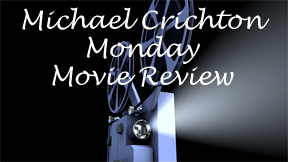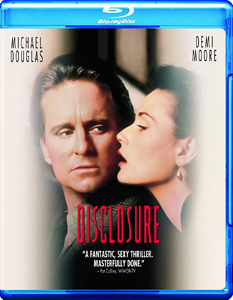Writer Paul Attanasio fairly cleanly adapts “Disclosure” (1994) from Michael Crichton’s novel from earlier the same year. But simply by being in a different medium, movies can give a viewer a different feel. Cinematically, this story of an Everyman against a System evokes a Seventies noir aesthetic, except in a cutting-edge Nineties setting.
Dated, but only superficially
Viewed today, “Disclosure” is superficially dated. Gen-Z’ers and younger millennials think Lex’s excitement about an interactive CD-ROM is hilarious in “Jurassic Park” (1993), but that’s a small taste of what we get in this slow-burn office-space thriller.

“Disclosure” (1994)
Director: Barry Levinson
Writer: Paul Attanasio (screenplay), Michael Crichton (novel)
Stars: Michael Douglas, Demi Moore, Donald Sutherland
The B-plot is about DigiCom’s production of handheld CD-ROMs. Imagine connecting to the internet with your smartphone. Except instead of the internet it’s a single disc of information, and the device is nothing more than a browser.
Crichton also looked one step further and predicted virtual reality would be how people navigate databases – and presumably, the internet.
Dawn of the digital age
The author was wrong about these specifics. So “Disclosure’s” CGI-enhanced sequences of hardware-production head Tom (Michael Douglas) and executives navigating the VR “Corridor” are a peek into a path not precisely taken.
However, the sense of excitement about a smaller-component future lays thick over the foundation of “Disclosure.”
Tom’s Seattle workplace has glass-walled office spaces, and everyone has a computer at their desk. So tech-prediction misfires aside, director Barry Levinson’s film plays like a step into a new era. That era might be nearing an end now, as we enter the Work From Home age, but it feels vibrant in “Disclosure.”
Tower of power
The A-plot also puts “Disclosure” firmly at a point in time. In the novel, Crichton illustrates how sexual harassment is about power, not sex. To do so, he flips gender expectations and shows a man (Tom) sexually harassed by his boss (Meredith, played by Demi Moore).
Both actors are wholly believable in the famous pivotal sequence in Meredith’s high corner power office that looks out on Seattle’s nightscape. Tom says “no” to Meredith’s advances several times before finally leaving.
As viewers, we might be tempted to say “He’s a man; he could’ve left at any time.” But the sequence, especially when later explored in detail by Tom’s lawyer (Roma Maffia’s Catherine), illustrates how the boss holds the power, even if they are a woman.
Charismatic little guy
Douglas is a surprisingly effective Everyman. He doesn’t dial down his charisma. The fact that Tom is the target of the corporation is enough to make him into the little guy.
The book’s vibe of hopelessness is slightly lessened in Attanasio’s version, as Tom has several close allies to balance out those who hate his guts. (A highlight in the latter category is colleague Mark; he’s played by Dennis Miller, whose one-liners sound like he wrote them himself.)

Differing from the book, Tom’s wife Susan (Caroline Goodall) is in the thick of it with him. There’s not as much weight on Tom about how outsiders will misperceive the events. The film focuses on the specifics of “the game.”
‘Virtual reality’ vs. the truth
“Disclosure” shows how sexual harassment cases lead to another definition of “virtual reality.” DigiCom head Bob (Donald Sutherland) presciently notes that “versions” are starting to replace “truth” in the information age.
The film merges the two themes less effectively than the novel. Levinson and Attanasio (who would reteam to adapt “Sphere” in 1998) are more interested in exploring adjustments toward the new abundance of women in the workplace.
In the coda, they hit on the answer: Treat everyone the same, and hire the best person for the job. Given that companies still struggle with this, “Disclosure” isn’t all that dated after all.

